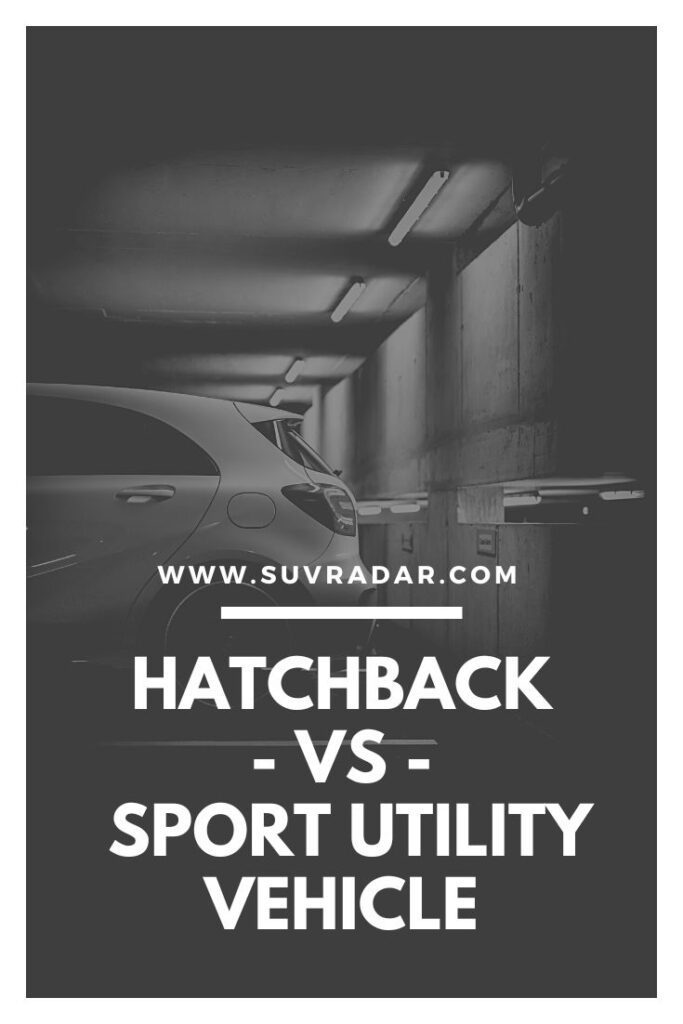SUVs, the darlings of the moment, have captured the hearts of car enthusiasts everywhere. With their commanding presence on the road and generous interior space, these versatile giants dominate the streets.
On the other side of the spectrum. We have the underappreciated hatchbacks with less generous interior space, a body style that Americans are yet to fully embrace.
When comparing hatchback vs SUV, the question of whether you’re buying the ‘wrong’ car depends on your personal needs and preferences. If you require ample space, off-road capability, or towing capacity, an SUV might be a better choice. However, if fuel efficiency, maneuverability, and a smaller footprint are more important to you, a hatchback could be a more suitable option.
If you are on the hunt for a new car, it’s most important to make an informed decision and save every penny you can.
In this blog article, we will explore the critical contrasts between SUVs and Hatchbacks, helping you make an informed decision that perfectly aligns with your needs and wallet.
Without further ado, let’s dive into the fascinating world of SUVs and hatchbacks – America’s most famous car types.

What is an SUV?
SUVs (Sport Utility vehicles) are characterized by their robust build, spacious interiors, and elevated ride height. They often blend the attributes of a traditional car with the capabilities of an off-road vehicle, making them versatile for various lifestyles and driving conditions.
SUVs have become a sought-after choice for many drivers due to several compelling reasons. Its versatility and ability to accommodate passengers and cargo make it suitable for family trips, outdoor adventures, or daily commutes. It’s Safety and security that instills a sense of confidence and security on the road. Its off-road capability makes it well-suited for tackling various terrains and weather conditions.
It offers a distinct aesthetic appeal, combining sleek lines with a commanding presence on the road.
What is a Hatchback?
Hatchbacks are compact vehicles characterized by a rear door that extends upwards, providing access to the cargo area. The hatch design eliminates the limitations of limited trunk space found in sedans while embracing the flexibility of larger vehicles.
They offer a remarkable blend of passenger and cargo space, making them ideal for individuals with active lifestyles. Whether it’s transporting bulky items or accommodating passengers comfortably, hatchbacks excel in adapting to your ever-changing needs.
Unlike their SUV counterparts, hatchbacks possess superior handling capabilities, ensuring an engaging driving experience. With their nimble nature, they effortlessly navigate tight city streets and winding country roads, making every journey a delight.
Key Differences between an SUV and a Hatchback.
Here are the key differences between an SUV and a hatchback.
1. Size and Space:
SUVs are generally larger and offer more interior space, both for passengers and cargo. They often have a taller and more upright design, providing a commanding view of the road. Hatchbacks, on the other hand, are smaller and have a compact design, making them more maneuverable in urban environments.
2. Ground Clearance:
SUVs typically have higher ground clearance than hatchbacks, which gives them an advantage when driving on rough or uneven terrain. This feature, combined with their available four-wheel-drive systems, makes SUVs more suitable for off-road adventures or adverse weather conditions.
3. Utility and Versatility:
SUVs excel in terms of utility, as they often have larger cargo capacities and can accommodate bulky items more easily. They may also offer towing capabilities, making them suitable for hauling trailers or boats. Hatchbacks, while not as spacious, still offer decent cargo room, and their rear seats can often be folded down to create additional space.
4. Fuel Efficiency:
Hatchbacks generally have better fuel efficiency compared to SUVs. Due to their smaller size and lighter weight, hatchbacks require less propulsion power, resulting in better mileage. This can be advantageous during times of high gas prices when people are looking to save money on fuel expenses.
Hatchback vs SUV: Which is Better?
The question of what car is better depends largely on your specific needs, budget, and personal preference.
Hatchbacks
Buying a hatchback can be a suitable choice for a small family that travels less often. Here are some reasons why:
1. Easy to drive
Hatchbacks generally have a compact size, which makes them agile and easy to maneuver in urban areas or tight spaces. They have a smaller turning radius, allowing for easier navigation through crowded streets or parking lots.
2. Compact design for easy parking
Hatchbacks typically have a shorter overall length compared to sedans or larger vehicles. This makes them easier to park in tight spaces, such as narrow parking spots or parallel parking situations. Their smaller size makes them more convenient for urban driving and navigating through congested areas.
3. Lower maintenance costs
Hatchbacks are often more affordable to maintain compared to larger vehicles. They generally have smaller engines and simpler mechanical systems, which can result in lower repair and maintenance costs. Additionally, hatchbacks often have lower insurance premiums and better fuel efficiency, which can save you money in the long run.
SUVs
An SUV can also be a better option for those looking for a larger and more rugged car that is great for off-roading and hauling cargo. Here are the reasons why.
1. Space and Comfort
SUVs are known for their spaciousness. With generous headroom and ample legroom in the first and second rows, SUVs provide an atmosphere of luxury and comfort, ensuring an unparalleled travel experience for all occupants. While the third row might be more compact, the first two rows offer a sumptuous retreat for even the most discerning passengers.
2. Superior Ride Quality
While hatchbacks may excel on well-paved highways, SUVs truly shine when the road less traveled beckons. Thanks to their substantial wheel sizes and advanced suspension systems, SUVs conquer rough terrain with remarkable finesse. With their elevated ground clearance and rugged design, SUVs fearlessly navigate challenging conditions, proving their mettle on off-road adventures.
3. Unmatched Versatility
The unrivaled versatility of SUVs sets them apart with the ability to adapt to ever-changing demands. SUVs effortlessly transform to cater to a multitude of needs. Whether embarking on family vacations, indulging in outdoor pursuits, or simply tackling the demands of everyday life, SUVs effortlessly rise to the occasion, providing an unmatched level of adaptability.
4. Uncompromising Safety
When it comes to prioritizing the safety of your loved ones, SUVs excel on every front. Designed with families and safety-conscious drivers in mind, SUVs offer an elevated seating position that enhances visibility, ensuring a clear view of the road ahead.
Closing the Curtain
Ultimately, when weighing the difference between a hatchback and an SUV, It’s crucial to consider factors such as your daily driving requirements, budget, lifestyle, and driving conditions in your area when making a purchase decision. Additionally, it’s always recommended to test-drive different models and compare their features before making a final choice.




